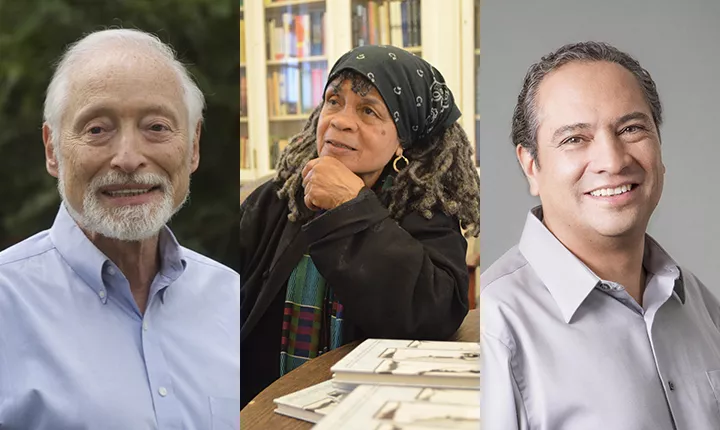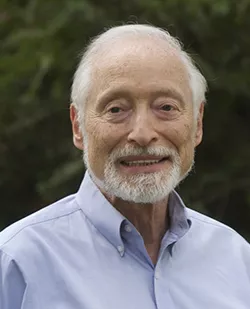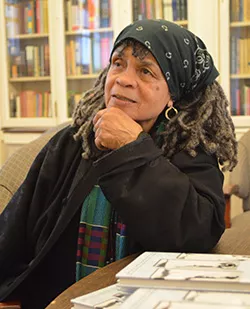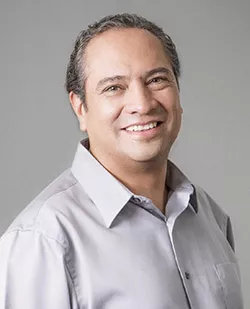Social Justice Advocate, Activist Poet, and Biomedical Engineer Named 2018 Honorary Degree Recipients

Edgar Cahn '56, Sonia Sanchez, and Francisco Valero-Cuevas '88 will receive honorary degrees at commencement on May 27.
President Valerie Smith will award honorary degrees to public interest lawyer Edgar Cahn ’56, poet and activist Sonia Sanchez, and biomedical engineer and educator Francisco Valero-Cuevas ’88 at Swarthmore College’s 146th Commencement on May 27. In addition, approximately 350 undergraduates will receive degrees at the ceremony in Scott Amphitheater.
Edgar Cahn '56

For more than 50 years, Edgar Cahn ’56 has worked to advance social justice, creating initiatives to address poverty, racism, injustice, and inequality.
After graduating from Swarthmore, Cahn married Jean Camper ’57, an African-American activist whom he met at the College. Working first as a speechwriter and counsel for Attorney General Robert Kennedy and as special assistant to Sargent Shriver, Edgar joined Jean in creating the National Legal Services program. Shriver credited the Cahns’ Yale Law Journal article “The War on Poverty: A Civilian Perspective” as the “genesis of legal services.” They are regarded as the founders of the field of poverty law.
In 1968, Cahn founded the Citizens Advocate Center as a government watchdog. In documenting the ongoing colonialism and exploitation of Native Americans, Cahn authored Our Brother’s Keeper: The Indian in White America. He also worked with leading Native American activists to initiate a campaign that led to official recognition of tribal governments and adoption of tribal self-determination as national policy.
Subsequently, Cahn spearheaded the first national campaign against hunger and malnutrition, authoring the report “Hunger USA” for a national board of inquiry. He simultaneously initiated litigation challenging the racially biased administration of the food stamp and commodities program that established the legal standing of recipients to bring suit. Related work led to legislation mandating shipments of food to severely malnourished communities in the South and on Indian reservations.
In 1972, the Cahns founded the Antioch School of Law, which reconceptualized legal education by utilizing as a central pedagogical vehicle a teaching law firm serving real clients. Attacked by academics at the time as anti-intellectual, the experiential program pioneered by Antioch is now an accreditation requirement for all law schools.
Designated by an act of Congress as the public law school of the nation’s capital, Antioch is now the David A. Clarke School of Law at the University of the District of Columbia, where Cahn serves as Distinguished Professor of Law. In addition to teaching Law & Justice to first-year students, he oversees their required 40 hours of community service and teaches System Change to faculty fellows in the school’s LL.M. program.
In 1980, Cahn began developing a unique tax-exempt currency, Time Dollars, to promote community building and empower residents. Use of this medium—undergirded by a web-based information system—has spread worldwide, renewing communities; providing a vehicle to bridge divides of race, class, gender, and national origin; and generating millions of hours of exchange. This hands-on work was coupled with development at the London School of Economics of a theoretical framework, “co-production,” which transforms clients from passive consumers of services to active co-producers of outcomes. Bridging theory and practice, Cahn was also instrumental in founding the Time Dollar Youth Court, the National Homecomers Academy, Cross-Age Peer Tutoring, and Carebank; his book No More Throw-Away People documents and chronicles those efforts.
A Fulbright Scholar and Ashoka Fellow, Cahn, who graduated from Swarthmore with a B.A. in English literature, earned a literature M.A. and Ph.D. and a J.D. from Yale University. In 2011, the Pennsylvania Bar Association and Swarthmore College began sponsoring an annual award named for the Cahns—given to a Swarthmore student for commitment to social justice and work in the youth court.
Sonia Sanchez

Sonia Sanchez is an award-winning poet, essayist, playwright, and political activist best known for her role in the Black Arts Movement.
Sanchez has authored more than a dozen collections of poetry, as well as short stories, critical essays, plays, and children’s books. She is the recipient of numerous literary prizes and awards, including a Pew Fellowship in the Arts (1992–93), the Langston Hughes Poetry Award (1999), the Harper Lee Award (2004), and the Poetry Society of America’s Robert Frost Medal (2001).
Famed for her sonic range and dynamic public readings, Sanchez is known for her innovative melding of musical formats, such as the blues, with traditional poetic formats like haiku and tanka as well as the unique sound of Black English.
After spending several years as a teacher in a Manhattan elementary school in the mid-1960s, she accepted a teaching position at San Francisco State University and introduced Black studies courses, the first of their kind at a predominately white university.
Becoming deeply involved in civil rights, Sanchez gained a national reputation after publishing her first book of poetry, Homecoming, in 1969. This collection and her second, We a BaddDDD People, established her as an artistic visionary who used experimental poetic forms to discuss the development of black nationalism and identity.
Sanchez was the first Presidential Fellow at Temple University, where she began teaching in 1977. There, she held the Laura Carnell Chair until her retirement in 1999. She has taught as a professor at eight universities, lectured at hundreds of college campuses, and read her poetry in Africa, the Caribbean, China, Australia, Europe, and Canada.
In November 2015, she spoke on Swarthmore’s campus, addressing such issues as the Black Lives Matter movement, women’s liberation, peace, racial justice, and black culture and literature.
She is the author of Shake Loose My Skin, Morning Haiku, Does Your House Have Lions?, Like the Singing Coming Off the Drums, and Wounded in the House of a Friend.
Francisco Valero-Cuevas '88

Francisco Valero-Cuevas ’88 is a biomedical engineer who uses his training to improve the quality of life for people who have limited use of their bodies and hands.
A professor of biomedical engineering, biokinesiology, and physical therapy at the University of Southern California, he is best known for his work that combines multiple fields to understand how the brain controls the body, and its clinical and robotic applications. He directs the Brain-Body Dynamics Lab, which is dedicated to understanding the biomechanics, neuromuscular control, and clinical rehabilitation of human function, and developing the fields of neuromechanics and neurorobotics.
In the early 2000s, Valero-Cuevas invented an important strength-dexterity test, and he has gone on to invent implants to restore grasp function and mechanisms for the construction of archways in civil engineering. His other inventions include implants to restore grasp function and mechanisms for the construction of archways in civil engineering. Recently, he published the book Fundamentals of Neuromechanics.
For his accomplishments, Valero-Cuevas received the National Science Foundation’s CAREER Award in 2003, was elected senior member of the Institute of Electrical and Electronics Engineers in 2013, and was inducted to the College of Fellows of the American Institute for Medical and Biological Engineers in 2014. He has also co-founded two nonprofits promoting the education and cultural integration of underrepresented minorities as well as a technology startup.
Valero-Cuevas came to Swarthmore from Mexico City and graduated with a B.S. in engineering. Following graduation, he lived in India and Nepal on a Watson Fellowship studying Sankhya yoga philosophy. He also received an M.S. in mechanical engineering from Queen’s University in Ontario and a Ph.D. in mechanical engineering from Stanford University. Before joining USC in 2007, he was a tenured associate professor at Cornell University.



